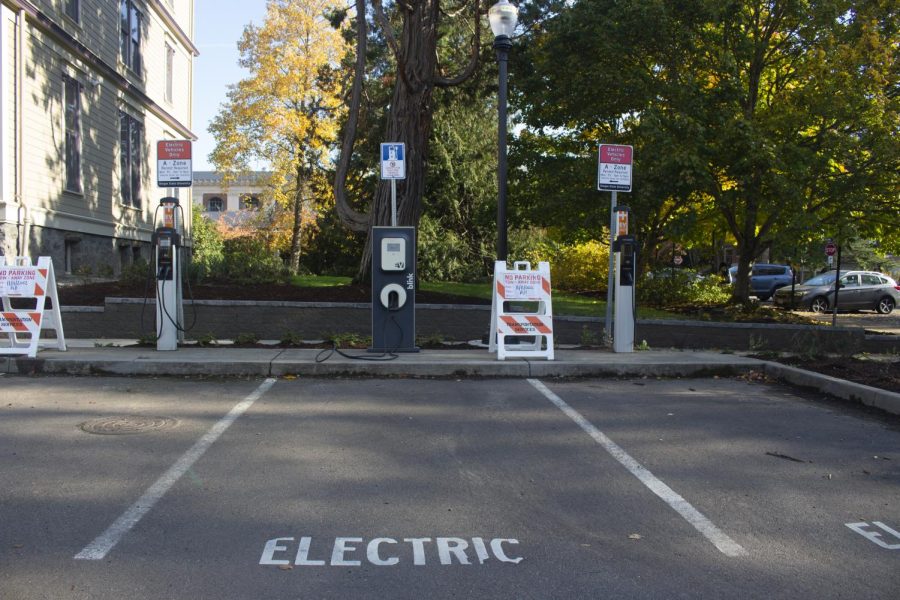OSU receives funds to research more sustainable batteries
Blink Charging Stations for electric vehicles located between Fairbanks Hall and the Asian-American Pacific Islander Culture Center at Oregon State University’s Corvallis Campus in Oregon, photographed on June 10th, 2022. These sustainable chargers are open to use for those holding parking permits for the specific lot.
November 13, 2022
Oregon State University has received $3 million from the Department of Energy to develop a new, high-energy-density battery that doesn’t contain rare elements, according to a recent OSU press release.
The research comes as demand soars for the cobalt and nickel used in the batteries’ cathodes, according to OSU Chemistry Professor Xiulei “David” Ji in the press release.
“It is predicted that there will be shortages of both elements in a matter of just decades, which means there is a pressing need to invent an alternative rechargeable battery chemistry that does not involve rare elements and potentially provides a higher energy density as well,” Ji said in the press release.
According to the press release, all batteries contain the same basic components: “Two electrodes – the anode, from which electrons flow out into an external circuit, and the cathode, which acquires electrons from the external circuit – and the electrolyte, the chemical medium that separates the electrodes and allows the flow of ions between them.”
Lithium-ion, sodium-ion, magnesium-ion and zinc-ion batteries use cations, an atom or a molecule that has lost one or more electrons and is positively charged. An anion, an atom or molecule that has gained one or more electrons and is negatively charged, can also be used.
“There are fewer known materials that can store anions reversibly than for storing cations,” Ji said.
Reversibility means that a battery is rechargeable.
An anion battery could be more sustainable than a cation battery, according to Ji, because they do not require electrodes with cobalt or nickel in them.
Preliminary results from the project have shown that anion batteries can deliver results comparable to current batteries while using cost-effective materials.
“Our goal is to reveal the mechanisms behind those batteries and to understand the limiting factors in anion battery reactions,” Ji said in the press release. “We also want to generate fundamental knowledge about the conditions and battery constituents that will allow anion-hosting batteries to deliver high energy density with a stable cycling life.”
Ji will be leading a team with researchers from OSU, Howard University, the University of Maryland and Vanderbilt University.


















































































![Newspaper clipping from February 25, 1970 in the Daily Barometer showing an article written by Bob Allen, past Barometer Editor. This article was written to spotlight both the student body’s lack of participation with student government at the time in conjunction with their class representatives response. [It’s important to note ASOSU was not structured identically to today’s standards, likely having a president on behalf of each class work together as one entity as opposed to one president representing all classes.]](https://dailybaro.orangemedianetwork.com/wp-content/uploads/2025/03/Screenshot-2025-03-12-1.00.42-PM-e1741811160853.png)

























